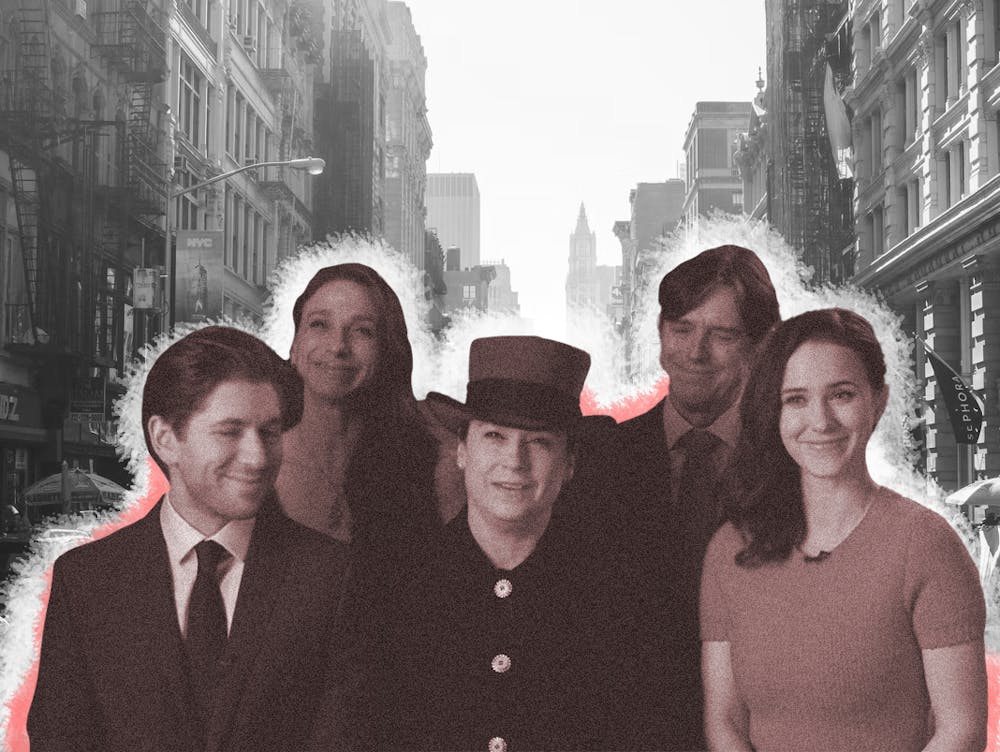I’m absolutely plotzing.
To those who don’t know this esoteric term, I will explain it to you: Plotzing is the continuous form of plotz.
Plotz is a Yiddish word, meaning to become physically overcome with feeling, positive or negative, in some sort of emotional outburst, explosion, or collapse. Like many Yiddish words, the definition is somewhat flexible: One can nearly faint of anguish—this is plotzing. But one can also erupt in tears of joy at a wedding, and we’ll call that plotzing, too.
My physical body stays fairly in touch with my emotions—many of my calories are actually burned through anxiety sweats. But right now, I am above and beyond. I’m super–plotzing. How am I plotzing? Let me count the ways.
I enter my plotzing through a tense, hyper–alert state as I type from my childhood bedroom at 3 a.m. I’m home for spring break and listening for the footsteps of my slightly overbearing Jewish parents. They worry if I don’t get enough sleep and I need to be able to quickly turn off my lamp and computer if I hear them in the hall.
But I had to stay up. This article is my review of season four of The Marvelous Mrs. Maisel, and I wanted to fit in the newly released final two episodes before writing. I’ve loved the show since its first season, in which the titular character, a perfect Jewish housewife in 1958, leaves her husband and becomes a feisty stand–up comic. Over the episodes since, Mrs. Maisel, or Midge, has performed everywhere from resorts in the Catskills to the Apollo. She’s interacted with real–life figures, like Lenny Bruce, but also her large fictional family, who has to come to terms with her unexpected career.
So the plotzing begins: My nerves translate to some nervous glances and grimaces around the room as I picture my editor reading this piece in the morning. I continue to mutter “oy” to myself and drum my fingers on my nightstand as I consider the idea that I’m not even following the angle that I was supposed to be working toward. I'd planned to write about the pattern of non–Jewish women being cast as Jewish characters. Maisel is a classic example of this frustrating, often ignored issue; non–Jewish actresses portray the title character and her mother, both of whom are flawed but empowered heroines making their ways through a man’s world with elegance and aplomb. Meanwhile, the show's Jewish actresses often lose all of their femininity in the caricatures they portray. The womanhood of Alex Borstein’s Susie is often rejected under the repressive gender norms of the 1950s, and Caroline Aaron’s Shirley Maisel is usually completely smothered in the stereotype of the pushy Jewish mother.
I half–heartedly shake a fist in the air—I recognize that I don’t have all, or any, of the answers when it comes to the casting debate. I love the show enough that often I can ignore its problems, but this is the one about which I feel I should have some opinion. Many other Jewish people are unhappy about it. When my grandfather started watching the show, I didn’t understand his frustration over the portrayals of the Maisels. Yes, they were brash, unassimilated, and even cheap, but they still felt rooted in the reality of someone’s Jewish in–laws somewhere.
I went into this season determined to watch with a critical eye. Keeping in mind the dangerous power of stereotypes, I found myself cringing (almost to a full plotz) when Moishe and Shirley Maisel would go to lengths to find a new girlfriend for their son or save a few bucks.
But now, after finishing the season, I’m plotzing. I’m sitting here, mouth agape, hands tossed up to my face, with tears welling up in my eyes as I reflect on how perfectly the last story arc of the season captured the love that exists within a Jewish family. When placed in a tough situation, Moishe and Shirley Maisel turned around and showed the flip side of the overbearing, over–protective, and overinvolved Jewish parents. Those qualities, often portrayed as flaws, were given their full credit as acts of love. They were acts performed by those who can fully appreciate the precarious and lucky position of being a Jew in America, and who want to ensure the stability and prosperity of their family’s legacy in this fortuitous country. In short, the Maisels were finally humanized.
When Abe Weissman, Midge's father and Moishe’s more assimilated foil, acknowledges that Moishe has been successful in these aims, it’s a moment of validation. The Maisels’ eccentricities finally get credit for being a force of steadiness that generously kept not just the immediate family, but even the mishpucha (extended, not–quite related relatives, like the Maisels and Weissmans, whose children are divorced from each other) afloat while others floundered.
I’m getting verklempt just writing about it.
Ultimately, Maisel's fourth season makes clear that the show’s writing team, led by Amy Sherman–Palladino, is still surpassing itself. In addition to constantly cracking up at their amazing humor, I plotzed my way through powerful moments across the eight jam–packed episodes, and I recommend you do too. If you’ve never plotzed before, now is a great time to learn.
Drool at the mouth over the visceral image of a 1960s Broadway musical–comedy opening. Cheer along to the still–relevant realizations of the value of women in this world. Get a bit misty–eyed at the season’s thematic exploration of mortality, and full–out weep at the touching tribute to actor Brian Tarantina, who passed away in 2019.
And translate the affection of the family on–screen into a call to your mother. Maybe I’ve stretched the definition of plotzing too far, but she’s worried sick because you’ve been staying up late writing for that magazine and aren’t sleeping enough.
(Mom, I love you, and I’ll take a nap tomorrow to catch up.)

